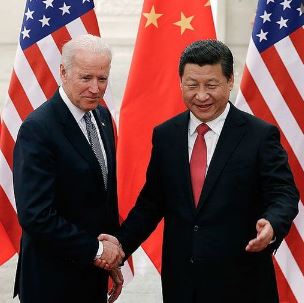Washington: The US and China could easily veer towards a conflict if their “complex and competitive” relationship is not well managed, US National Security Advisor Jake Sullivan has warned ahead of the much-anticipated summit between President Joe Biden and his Chinese counterpart Xi Jinping.
Biden and Xi are scheduled to meet in San Francisco Wednesday on the sidelines of the Asia-Pacific Economic Cooperation (APEC) Leadership meeting in San Francisco. The two top leaders last met face-to-face at the G20 Summit in Bali in November 2022.
Biden, 80, and Xi, 70, had already known each other for more than a decade before Biden became President in 2021.
Sullivan Monday said the US president has the opportunity to engage on how they effectively manage peace and stability across the Taiwan Strait. The two sides are also expected to discuss China’s aggressive actions in the Indo-Pacific region.
Sullivan said the most important thing is that “this is a complex and a competitive relationship that could easily veer into conflict or confrontation if it’s not well managed”.
“So, managing the relationship effectively is the single most important responsibility of the president and everyone who works for him on this file,” Sullivan told reporters at a news conference here.
Taiwan is likely to be at the top of the list of topics China will be keen to discuss with Biden. Beijing claims sovereignty over the self-ruled island, which is set to hold elections early next year. China has held provocative military exercises around Taiwan in recent months to warn the island against taking any steps to declare independence.
The Israel-Hamas war, the war in Ukraine, human rights, and trade disputes are expected to be discussed during the Biden-Xi meeting.
Bilateral relations plunged to a new low last August when Beijing cut off major communication channels with Washington in retaliation for a high-level US visit to Taiwan. Attempts to restore dialogue were derailed this February when a US fighter jet shot down a Chinese surveillance balloon over American airspace.
Since then, the US has spent months seeking to engage China, its biggest strategic rival, including dispatching four cabinet-level officials to Beijing in recent months.
“Those are some of the issues that, through intense diplomacy, we have been able to manage,” Sullivan said.
“Then we will look for opportunities to actually generate affirmative outcomes that deliver tangible progress for the American people in areas where our interests overlap. I mentioned, for example, the issue of fentanyl.
“We’re hoping to see some progress on that issue this coming week, and that could then open the door to further cooperation on other issues where we aren’t just managing things, but we’re actually delivering tangible results,” Sullivan said.
“Beyond that, the US and China have to be able to speak directly to one another on all of the critical issues that face our two countries, including issues in moments of crisis like the Russia-Ukraine crisis.
President Biden has had a number of candid conversations with President Xi about the question of military support to the Russian Federation in the conduct of its war in Ukraine,” he said in response to a question.
During the San Francisco meeting, Sullivan said that he anticipates the leaders will discuss some of the most fundamental elements of the US-China bilateral relationship, including the continued importance of strengthening open lines of communication and managing competition responsibly.
“The way we achieve that is through intense diplomacy. That’s how we clear up misperceptions and avoid surprises. That’s how we work together where and when our interests overlap and deliver on key priorities for the American people,” he said.
Sullivan said in recent months he met the Chinese Foreign Minister and Director of the ruling Communist Party of China Central Foreign Affairs Commission Wang Yi thrice, and top US secretaries of State, Treasury, and Commerce all went to Beijing.
“China for its part sent its vice president, foreign minister and other senior officials to the United States in recent months. President Biden comes into this summit on a solid footing, given the ways in which he has positioned the United States to be able to compete effectively both at home and around the world,” Sullivan said.
Responding to questions, he talked about having lines of communication open to manage competition responsibly.
“That’s what the (US) president has set out to achieve in this summit with President Xi. He sees this not just as a one-off meeting, but as an important moment to be able to establish the kind of basis upon which we can proceed out into the future,” Sullivan added.
In Beijing, Mao Ning, a spokesperson for the Chinese foreign ministry said the two presidents will have in-depth communication on issues of strategic, overarching and fundamental importance in shaping China-US relations and major issues concerning world peace and development.
“China does not fear competition, but we do not agree that China-US relations should be defined by competition,” Mao said.
The US needs to respect China’s concerns and legitimate right to development, rather than emphasising its own concerns at the expense of China’s interests,” she said Monday.
“The Taiwan question is China’s internal affair and resolving it is a matter for the Chinese that brook no foreign interference,” Mao emphasised.
She also noted that China has made clear on multiple occasions the nature of the South China Sea issue. “China will neither take any inch of territory that is not ours, nor give up any inch of territory that belongs to us,” Mao added.
PTI
